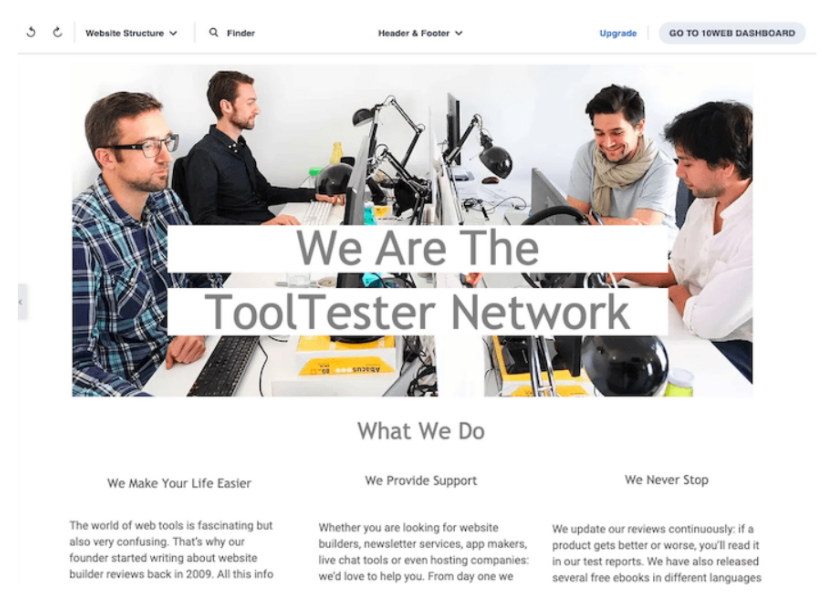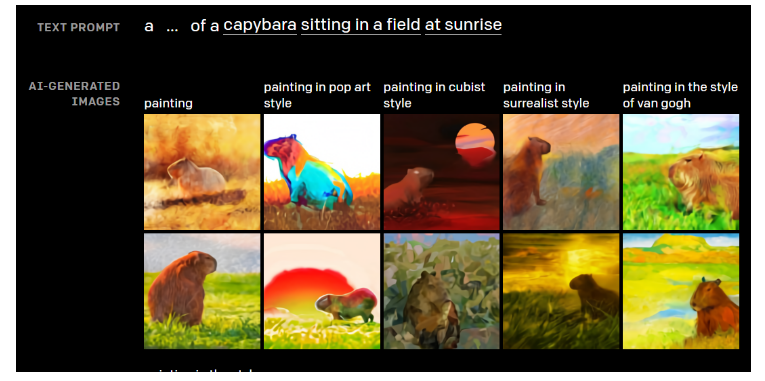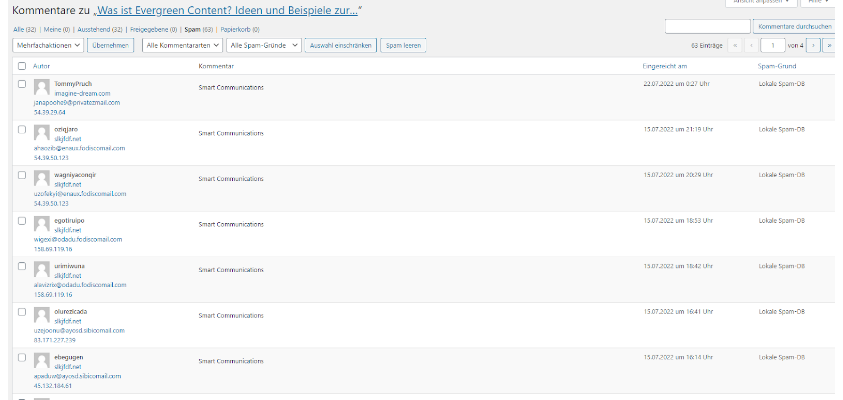Artificial Intelligence, Content Management Systems, and WordPress – 8 Practical Applications

What role can artificial intelligence play for content management systems like WordPress?
CMSs already rely on AI-based algorithms, for example, for filtering spam, personalizing ads, or sentiment predictions. Trends such as no-code web development or text-generating software promise more extensive applications for AI in content management in the future.
Will this development ultimately lead to computers that automatically program entire websites and also write content? In this article, we shed light on the potential of artificial intelligence for content management systems. We explain the most important AI concepts and present eight CMS areas in which these technologies are expected to create significant changes.
What is artificial intelligence?
There is no clear definition of artificial intelligence (AI). Individual AI-based concepts such as machine learning, neural networks, or deep learning are often equated with the term “artificial intelligence.” However, AI is an umbrella term for situations where computers perform tasks requiring human-like intelligence. Most AI technologies work based on Big Data. Computers search large amounts of data for correlations and patterns to answer specific questions or make predictions about future situations.
AI-based technologies have also been successfully employed for a long time in the field of content management systems and WordPress. The most important AI applications for CMSs rely on the concepts of Natural Language Recognition, Speech Recognition, or Natural Language Understanding. We will discuss these AI applications in more detail later in the article.
What role does artificial intelligence play in content management and for WordPress?
AI applications have arrived in web development and content management and will soon make many tasks easier for companies relying on WordPress. We explain what role AI plays in these eight content management areas:
No-code web development
AI-based web development is still in its infancy. However, some website builders already allow anyone to create their site, even if they don’t have programming skills. In this case, users give the AI specifications about the type of company, the purpose of the website, and which features should be included. In just a short time, the programs then generate website prototypes, that can still be manually customized with drop-and-drag editors in many cases.

Website quality is the most frequently asked question about no-code web development. As a matter of fact, the most capable and modern programs always perform better in tests. AI-based website builders are already a legitimate option for private homepages and projects, and even small businesses are achieving success with the programs.
However, most experts consider AI for web development not yet sufficiently developed for the enterprise level. Users still report security vulnerabilities or technical issues and would like to see more third-party integration and customization options. Established and secure CMSs such as WordPress allow companies to add any imaginable feature or extension and can be customized manually.
Content creation
One area where AI is further along than many marketers realize is text content creation . Some programs can already generate texts almost completely on their own. Naturally, it doesn’t work entirely without human instructions. The tools need a short description of the topic or an outline of the text. Creating the content works thanks to what is known as Natural Language Generation:
AI Basics: Natural Language Generation is part of Natural Language Processing and describes the conversion of structured data into text. Computers thus generate language that is understandable to humans based on data records. NLG has great potential, especially in text generation. Until now, it has been relatively easy to recognize a language-generating AI when interacting directly with it. However, it is more difficult to tell whether a text was written by a machine or a human.
The AI crawls millions of sources on the given topic and creates content based on these. There are different options for the different text types and goals. Some programs, for example, optimize snippets, headlines, or social media copy; others generate a whitepaper from several blog posts and take over email marketing or product descriptions in E-commerce. Anyone who uses WordPress can rely on AI-based products from various providers
These days, texts generated in this way still require manual optimization. Marketers need to adapt texts and tone to connect with the target group. Content marketing experts, therefore, do not at this time expect AI to be able to completely replace humans in the creation of texts in the near future.
AI Future outlook: An essential factor in content management is content planning. In the future, AI-based tools will not only be able to create content themselves but make suggestions for potential new topic areas. There will also be the possibility of examining existing content to find gaps.
AI is already a bit further along with proofreading and translation. Widely used WordPress extensions rely on machine learning to generate suggestions for better wording or to point out grammar and context errors. Progress is also being made in terms of AI-generated images.
One area where AI technologies are already achieving impressive results is the creation of images and graphics. In particular, the open AI project Dall-E (the name is a mix between Wall-E and the painter Dali) is currently attracting the attention of marketers and content managers. Dall-E can convert text instructions of up to 400 characters into graphics. The project is still in a beta testing phase and is currently accessible to only 1 million users worldwide. The soon-to-be-launched product will undoubtedly revolutionize the role of UX/UI design in future content creation.

Search Engine Optimization
No matter which content management system a company uses today, search engine optimization still requires a lot of manual human input. From keyword research to link building to regularly updating and optimizing articles, marketers must invest time in tasks that are often repetitive.
WordPress is already compatible with some software that automates many of these tasks. AI-based software, for example, can optimize content length and format for different channels and screen sizes. This ensures mobile-friendliness, which is essential for rankings. In addition, some applications generate suggestions on how to SEO-optimize titles, meta descriptions, and URLs.
Tagging and categorizing images is a tedious task for many content managers. However, this activity is essential, especially in E-commerce. Content management systems already implement AI-based software that automatically recognizes what is depicted on a graphic. Blog posts or articles are also properly categorized, reducing the workload, especially for large newsrooms and companies that publish a lot daily.
AI Future outlook: Future CMSs will also take over the optimization and testing of existing pages. AIs will create multiple slightly customized versions of a page and automatically perform A/B tests. Over time, this allows them to learn how to build the ideal website for a company’s customer group. The CMS then gives the copywriter tips during the writing process regarding SEO-optimized word choice and points out the ideal color of a button to the graphic designer.
Sentiment prediction
In addition to pure sales statistics, the opinions and feelings customers associate with a company are also essential. By sentiment analysis, marketers primarily mean programs that analyze the general opinion regarding a brand based on comments and mentions on social media.
Some CMSs, including WordPress, can now be extended to predict what users feel when visiting a page or reading a text. For example, AI can analyze tone and word choice to see if they are appropriate for the target audience. This works based on Natural Language Understanding:
AI Basics: Natural Language Understanding is about computers understanding what humans write or say. Instead of just the literal statement, the AI can also interpret the intentions, feelings, intensity and goals behind what is being said.
Personalization
On E-Commerce websites, AI is mainly used to personalize offers. After a purchase transaction, it understands what other products might interest the user. In this way, AI supports cross-selling and upselling with appropriate product recommendations. Sophisticated programs even estimate which colors or brands work best with certain customers based on user behavior. AI suggests potentially interesting additional content to readers on news sites or large blogs based on the same principle.
Large online stores now also leave pricing to artificial intelligence. The computers learn what prices customers are willing to accept and adjust accordingly over time. Particularly advanced applications can also predict demand at certain locations at certain times.
AI Future outlook: Future AI will understand the entire customer journey. Content management systems will collect and understand detailed data on customer behavior across the various touchpoints. Depending on where a customer is in their customer journey, the CMS will understand what content needs to be presented to achieve that goal.
Security
Artificial intelligence has played a crucial role in keeping most CMSs secure. Implemented machine learning and neural networks enable content management systems to detect malware and spam bots.
Many CMS users are not even aware of the importance of the work of these AIs. Spam comments generated by bots are like poison for a site’s authority and load times. Without the help of AIs, the site operator has to scan comments for spam and delete them accordingly. Sites with a lot of traffic, in particular, are often affected by spam to such an extent that manual filtering becomes impossible.
WordPress addresses this problem with the Akismet plugin. Akismet is a product of Automattic and has been included in every WordPress installation from the beginning. The plugin understands which bots are most likely to target the site and prevents their comments from being published. Meanwhile, Akismet can reliably distinguish real comments from spam. WordPress can also be extended to fend off AI-based viruses, spyware, Trojans, and other attacks like code injections.

Whether GDPR, CCPA, or HIPAA, companies are subject to strict compliance guidelines these days. Personal or other sensitive data, for example, may only be stored internally in certain ways or not at all. Content management systems use AI to ensure content security. Manual audits performed by the team on all internal documents are time-consuming and prone to errors. AI-based software can automatically scan all internal content and ensure it does not violate the company’s security and compliance policies.
Search function
Any modern corporate website has an internal search function. On many CMSs, this search function runs with the help of artificial intelligence. The programs learn what users often search for and understand the intentions behind the search queries. Google’s search function also works this way. The AI thus corrects spelling mistakes in the search bar, gives suggestions for similar search terms, and completes user queries after only a few letters.
AI also plays a crucial role in voice search. Companies are increasingly relying on this feature, and rightly so. Recent studies show that 30% of all browsing sessions involve voice searches and 41% of all adults use such functions daily. The AI technology behind most voice search programs is speech recognition:
AI Basics: Automatic Speech Recognition (ASR) refers to the ability of a machine to convert human speech into text form. Thanks to Deep Learning and Big Data, computers have advanced significantly in this discipline in recent years. The most capable programs now understand spoken language even more clearly than humans. Speech recognition is already enabling Siri and Alexa products and is behind automated customer service hotlines, for example.
Customer service
For E-commerce sites of international retailers, in particular, it pays to be available 24 hours a day to answer questions from customers all over the world. Instead of hiring resource-intensive staff for this purpose, more and more companies are turning to chatbots. AI-based chatbots, especially, are constantly improving and learning. Users are noticing this, too. Studies show that 70% of respondents consider chatbots useful in ordering processes. Chatbots stimulate customer engagement with the website, thus increasing user dwell times and reducing bounce rates.
AI Future outlook: Chatbots will also continue to develop and improve in the area of Natural Language Understanding. In the future, they will be able to understand intentions and emotions, giving users the feeling that they are communicating with a real service employee.
There are already numerous AI-powered chatbots in the WordPress universe that can be easily combined with WooCommerce. At Inpsyde, we are certified WooCommerce experts and are happy to help you implement these technologies.
AI for WordPress with Inpsyde
The beginnings of artificial intelligence are already part of most content management systems and will become more and more important for WordPress in the coming years. From content creation to search engine optimization to security aspects: If you want to keep your website competitive, sooner or later, you will have to understand and implement AI-based technologies.
If you want to discover the possibilities for implementing AI technologies in your project with us, contact our WordPress experts.